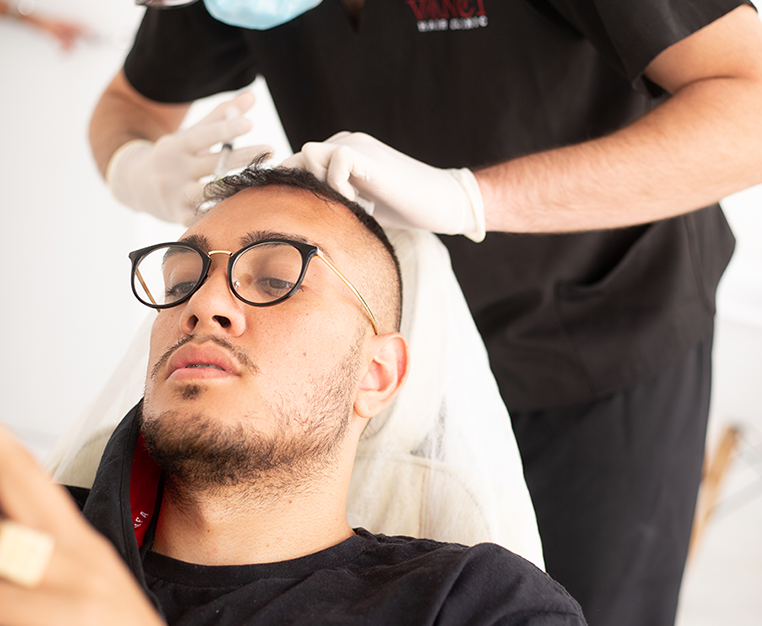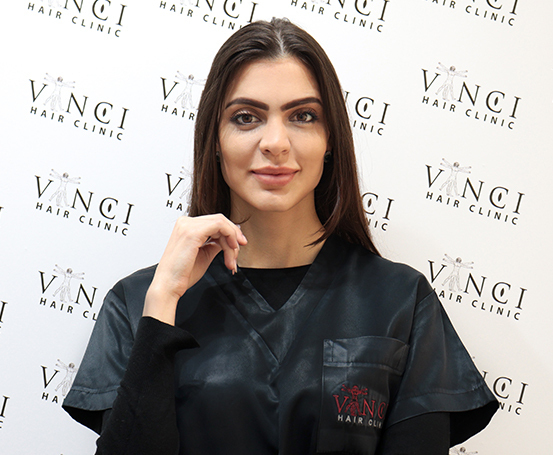Stress is a natural and inevitable part of life, but too much of it can have negative effects on your physical and mental health, including your scalp and hair. Stress can trigger or worsen various types of hair loss, such as telogen effluvium, alopecia areata, and androgenetic alopecia Stress can and also affect the quality and appearance of your hair.
How does stress cause hair loss?
Stress can cause hair loss in different ways, depending on the type and severity of stress experienced, the individual’s genetic predisposition, and the underlying condition of the scalp and hair follicles.
Some of the common mechanisms are:
- Stress can disrupt the normal hair growth cycle, which consists of three phases: anagen (growth), catagen (transition), and telogen (resting). Stress can cause a large number of hair follicles to enter the telogen phase prematurely, resulting in a condition called telogen effluvium, which is characterised by diffuse hair shedding across the entire scalp.
- Stress can activate the immune system to attack the hair follicles, causing a condition called alopecia areata, which is characterised by patchy hair loss on the scalp or other parts of the body.
- Stress can increase the production or activity of a hormone called dihydrotestosterone (DHT), which is derived from testosterone, the male sex hormone. DHT can bind to the receptors in the hair follicles and shrink them, leading to a condition called androgenetic alopecia, which is the most common type of hair loss, affecting both men and women.
Stress can also affect the quality and appearance of your hair, by causing or worsening conditions such as:
- Dryness and brittleness: Stress can reduce the blood flow and oxygen delivery to the scalp and hair follicles, which can impair the production of sebum – the natural oil that lubricates and protects the hair. This can result in dry, brittle, and dull hair, which is more prone to breakage and split ends.
- Graying: Stress can deplete melanocytes which are the cells that produce melanin – the pigment that gives color to the hair. This can result in premature graying or loss of hair color, which can make the hair look older and less vibrant.
- Dandruff and scalp inflammation: Stress can alter the balance of the microorganisms that live on the scalp, such as bacteria and fungi, which can cause or worsen conditions such as dandruff, seborrheic dermatitis, or scalp psoriasis. These conditions can cause itching, flaking, redness, and irritation of the scalp, which can damage the hair follicles and affect the hair growth.
How can you prevent or treat stress-related hair loss?
The best way to prevent or treat stress-related hair loss is to address the root cause of the stress, and find healthy ways to cope with it. Some of the strategies that can help you reduce and manage stress are:
- Seek professional help
- Practice relaxation techniques
- Exercise regularly
- Eat a balanced diet
If you are experiencing hair loss that is affecting your quality of life or self-image, you may also consider consulting with a board-certified dermatologist or a qualified skin-care professional, who can diagnose the cause and type of your hair loss, and recommend the best treatment options for you.
Some of the possible treatments are:
- Topical medications: Topical medications, such as minoxidil or corticosteroids, can be applied to the scalp to stimulate hair growth and prevent hair loss.
- Oral medications: Oral medications, such as finasteride or spironolactone, can be taken orally to block the production or action of DHT, which can help treat androgenetic alopecia.
- Laser therapy: Laser therapy, also known as low-level laser therapy or photobiomodulation, is a non-invasive procedure that uses low-intensity light to stimulate the hair follicles and increase their cellular activity, which can promote hair growth and prevent hair loss.
- Platelet-rich plasma (PRP) therapy: PRP therapy is a minimally invasive procedure that involves injecting the patient’s own blood plasma, which is rich with platelets and growth factors, into the scalp, to stimulate the hair follicles and enhance their healing and regeneration.
- Hair transplantation: Hair transplantation is a surgical procedure that involves removing hair follicles from one part of the scalp, usually the back or the sides, and transplanting them to another part of the scalp, usually the front or the top, where the hair is thinning or balding.
Get Your Customised Hair Solutions From This Professional and Experienced Hair Clinic!
Struggling with stress-induced hair loss? You’re not alone. The impact on your confidence and appearance can be disheartening.
Vinci Hair Clinic understands your frustration and we prioritise your well-being above all else. Our commitment to excellence has earned us the trust of over 100,000 satisfied customers. With 20 specialist doctors and 15 years of expertise, we have the knowledge and skill to guide you through your hair restoration journey with confidence.
We offer a range of treatments including topical medications like minoxidil, laser therapy, platelet-rich plasma (PRP) therapy, and hair transplants. Don’t let stress-related hair loss hold you back any longer.
Contact us today and take the first step towards thick, healthy hair!



